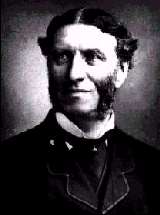
Born: December 24, 1822, in Laleham, Middlesex, England
Died: April 15, 1888, in Liverpool, England
Matthew Arnold was an English Victorian poet who is often called the forgotten poet of his era. Arnold was the first son of Thomas, the famed headmaster of the Rugby School. He attended Rugby himself in 1837, followed by Balliol College, Oxford. He won the Newdigate prize for poetry with his poem Cromwell in 1843 and graduated with second- class honors in 1844.
He briefly worked as a teacher of classics at Rugby, but then accepted a position in 1847 as the private secretary to cabinet minister Lord Lansdowne. Following his secretariate position, Arnold took the post of school inspector. In June 1851, he married Frances Lucy Wightman. Together, they had three sons.
Arnold traveled throughout Britain and Europe to compare various countries' educational systems. Two of his travel reports were released as books. He released his first volume of verse, The Strayed Reveler and Other Poems by A. in 1849.
In 1857, he was elected to chair of poetry at Oxford University, a position he held for ten years. His work was never as popular during his time as Tennyson or Browning because the range was considered too narrow. However, Dover Beach, published in 1867, is considered a classic of the period.
Arnold established several tenets of literary criticism. He advocated truthful interpretation and an understanding of works within their social and chronological framework. He recommended that works from certain writers, such as Shakespeare, should be used as benchmarks upon which to compare other authors. He felt that literature was a criticism of life and should be treated with all seriousness.
He was a literary and social critic known for his attacks on British society. He is most noted for Culture and Anarchy, published in 1869. In this work, he classified the population into three groups: the aristocratic and materialistic Barbarians; the middle class and vulgar Philistines; and the lower class and brutal Populace. He felt that hope for the future was found in the middle class, and that only culture would save them.
Arnold died of a heart attack in Liverpool and is buried at family plot in Laleham.